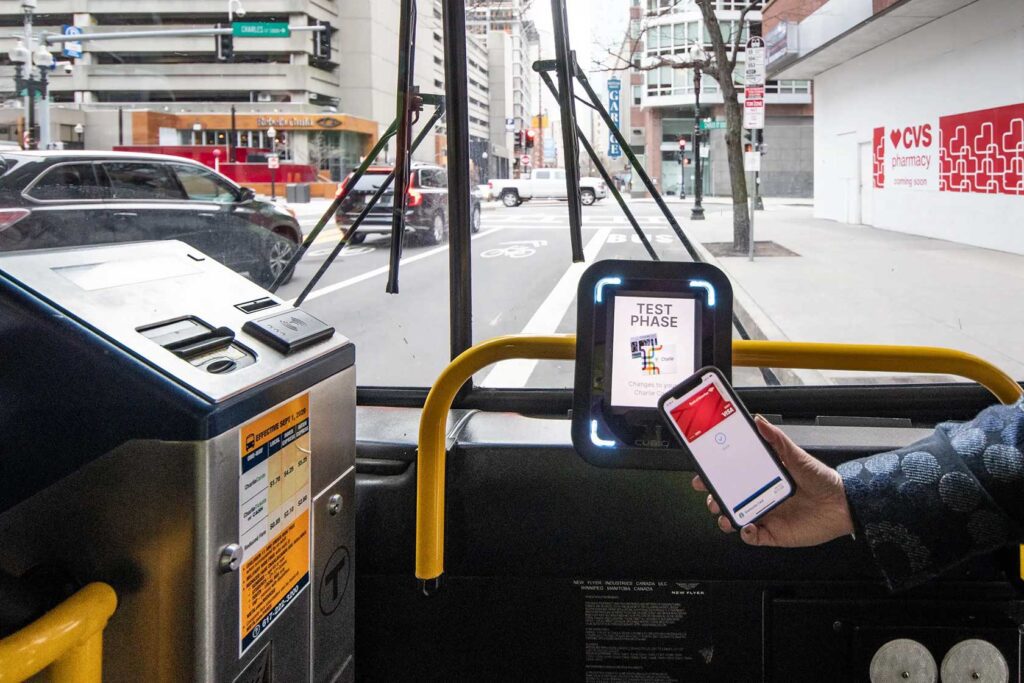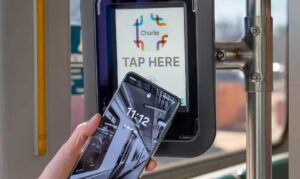
Changes are coming to the way MBTA riders pay for their commutes.
Beginning Aug. 1, subway and bus riders can ditch their Charlie Cards and paper tickets, if they choose, for a new contactless payment method, the agency announced July 9.
“Transitioning to this contactless system is a part of the next generation of transportation that our riders deserve,” said Monica Tibbits-Nutt, secretary and CEO of the Massachusetts Department of Transportation, in a statement. “This will allow them to save time and make it easier for riders and travelers to pay and board as they use the system.”
The long-awaited change is a step toward modernizing and streamlining the payment process. Riders on buses, Green Line trolleys and Mattapan Line trolleys will be able to use their phones, debit or credit cards, digital wallets and smartwatches to make contactless payments for their journeys.
The T previously said the Mattapan Line would not be included in the initial rollout.
The tap-to-pay system, already in use in major metropolitan cities such as New York, will also be implemented at subway fare gates.
“Last year, this project needed a course correction, and I’m proud of the progress made to deliver this important amenity for our riders, bringing our payment system for our bus and subway system into the 21st century,” said MBTA General Manager and CEO Phillip Eng, in a statement. “This lays the groundwork for the fare payment system of the future, incorporating our fare structure including the recently approved Income-Eligible Reduced Fares.”
In a press availability held Monday, officials said that as of today, the T has spent $23 million on the initiative. In total, the project, in partnership with California-based company Cubic Corporation, will cost the T $926 million. This was reduced from the initially proposed price tag of $967 million to figure in years-long delays in the rollout.
“This has been a long time coming,” said Jeff Cook, the T’s acting chief administrative officer, during the media briefing. He called the upcoming launch an “achievement” that “hopefully” the T “can continue to build off of.”
Some riders are looking forward to the new tap-and-ride system.
“I’m very excited,” said Caroline Olesky, a 24-year-old graduate student who lives on the border of Brookline and Allston near an above-ground trolley stop. She said “it’s amazing” that the T is adding other options and catching up to other cities in the U.S. and abroad that have long used tap-to-pay systems. The new payment method, she said, would also cut down wait times at surface-level stops.
Riders can locate the fare reader machines on buses and trolleys and at subway gates, find the contactless symbol on the screen, tap their card or device, and wait for the green checkmark before hopping on to ride, the T said.
“I think it would make it more convenient,” said Matthew C., a 28-year-old actuary residing in the Boston suburbs who would only provide his last initial. He said he travels into the city occasionally and typically purchases a temporary Charlie Ticket. The new system, he said, would be especially helpful for people from out of town.
Daniella Ramirez, 34, also said the new contactless payment method would make it easier to use the T. Ramirez rides the T approximately 3-4 times a week, and her job pays for her Charlie Card. “I don’t know how that would affect me,” the nurse said of the change.
The new payment option will not affect riders with weekly or monthly passes, the T said. Riders will also still be able to use their Charlie Cards to pay their fares. Those in reduced-fare programs, including seniors, students and TAP holders, can link their benefits to their contactless payment method of choice via the T’s website.
The contactless fare reader machines are in the test phase until Aug. 1, when they will launch to the public. The T began testing the machines in November 2023, inviting internal staff to use designated contactless payment machines, said Carissa Sacchetti, the T’s director of operational readiness and workforce development, during Monday’s media availability. Last week, on July 11, the T rolled out external testing, offering the general public a chance to try out the machines. The T has held a pop-up at Downtown Crossing and will soon hold others at Nubian Station and at Maverick.
“We’ve done our testing internally and feel confident in the system, and now we’re just bringing people on board to enjoy the system prior to launch,” Sacchetti said.
Those interested in participating in the early adoption phase can sign up on the MBTA’s website at mbta.com/fareprojects.
The T said it has not yet installed fare machines at rear-door entrances on buses. All-door boarding on buses, which the agency said will improve convenience and accelerate boarding time, will be introduced at a later date, officials said.
The T advised riders to hold their bags away from the machines or place them on the ground to avoid “the possibility of accidental taps and charges of their contactless credit or debit cards.”
The tap-to-pay system is set to roll out on commuter rail lines and ferries in the spring of 2026. Other forthcoming changes include new vending machines, new Charlie Cards, a mobile app and in-person customer support, all scheduled to launch in the spring of 2025.
The T is also in the process of establishing a fare engagement department, in the works for several years. The team will include a director, superintendent, a supervisor, and 16 fare engagement representatives who will begin working in mid-to-late December, specifically on the Green Line Extension, officials said.
The new payment method is “allowing our customers to pay in a way that they pay for other services and operations in their in their daily life,” said William Kingkade, senior director of automated fare collection for the T. “I think besides adding that as a convenience, if they choose to do so, they can also skip lines in the fare vending machines and go right to a fare gates or to the validators on onboard.”







